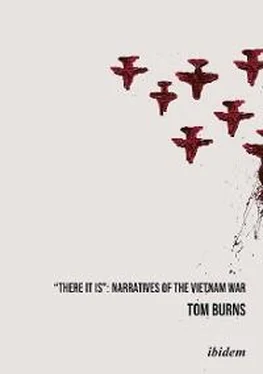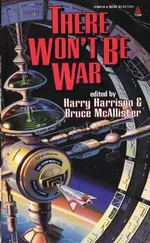Michaud tries to console Coltart by telling him that he was merely “the judas-goat,” the one that leads the other animals to the slaughter, and that he should just cut his losses, but Coltart feels guilty at his betrayal of the tribe and seeks out Yé, who has already threatened to kill him if he returns to the hills: “he only knew he had to go back, to share the fate of the montagnards, the fate which he had helped to shape” (217). After being fingered by a VC agent at Notre Dame du Bois, he is predictably captured by Loye’s group. He is being taken to North Vietnam for exchange or execution when the group is ambushed by an American advisor and government commando unit sent by Englehardt. With both Yé and Ilouha killed in the ambush, the outcome would seem to signify Coltart’s final betrayal of his montagnard friends and the triumph of Englehardt’s pragmatism. When the commandos torture and kill the wounded Loye, who was shot while attempting to help Ilouha, Coltart can only lamely say that “[he] was just a terrorist, Yé.” The old chief, still wiser, corrects him before he himself stoically succumbs: “He was a man, Erohé.”
Hempstone’s novel therefore reiterates The Quiet American ’s theme of the well-intentioned American (although Greene’s Pyle is not naïve in the way Coltart is) who brings pain and death upon those he thought he would help. Coltart’s connection with the Diem regime is simply an inheritance from his job as servant to a government that puts political priorities over lives, which is why the Diem plot, although the least developed of the three in the novel, cannot be omitted, because it serves as the motivation for the other two. In this novel, politics is a moral teacher: Loye dies because of his loyalty to Communism, which is his cultural inheritance or historical choice, but also (in the moral and ideological framework of the novel) because Communists are crueler than Americans. Coltart is simply luckier or (within the same moral context) his survival may be an opportunity for him to live out what he has learned. Although he is a much more honorable man than Greene’s Pyle, his limitation is precisely his inability to transcend his gullibility, a result of his background, his cultural heritage as well. As McWhorter observes:
He liked Harry Coltart, but in a curious way the Virginian’s world and the real world seemed to mesh only at certain points. Coltart, he mused, clings to many concepts, God, honor with a capital H, a mystical attachment to the soil, concepts which are fine in themselves but no longer have much relevance… (138).
Although the final phrase is meant to show McWhorter’s own cynicism, its truth is borne out by the events of the novel. Coltart will eventually recognize his full complicity in his failure to understand: “He and Englehardt were in it together though. Englehardt was right about that much” (266). When the worldly Frenchman, Michaud, tells him to go back to America, marry the girl-next-door and have backyard barbecues, Coltart reminds him that memory of guilt is not so pliable: “Those thoughts and faces are coming with me. They won’t fit in at the barbecue” (269)—a figurative but accurate summary of what will become the chief dilemma of the Vietnam veteran.
iii. Robert Vaughn, The Valkyrie Mandate (1974)
Vaughn’s melodramatic novel, The Valkyrie Mandate , also begins shortly before the coup that overthrew Diem. 41The Buddhist crisis has already erupted, Nhu is conducting his raids on the temples, and Lodge has been dispatched to Saigon as the new American ambassador. The presidential palace is barricaded, but the guards are lax enough that a Buddhist monk riding a Lambretta is able to penetrate the defenses and throw a bomb in a futile attempt to breach the walls. He is summarily executed by Colonel Duong, a trusted subordinate of Nhu and head of the dreaded Special Police. Duong is felicitously employed, for he is a sadist who admits he enjoys killing, even deriving sexual pleasure from executions.
By contrast, the protagonist, Lieutenant Colonel Justin Barclay, an American military advisor who works with Duoung, is a sympathetic character who not only speaks Vietnamese with admirable fluency but understands the cultural nuances and is thereby comfortable talking to anyone from the lowest peasant to the highest official. Barclay has been in Vietnam for ten years; he first came to the country with the Army Security Agency. He regards Saigon as his home town, and usually prefers the company of Vietnamese to that of his own colleagues, ugly-American types who understand so little of the culture that they employ Vietnamese translators who systematically mistranslate their propaganda. He himself, however, is playing a dangerous game as the lover of Lé, Colonel Duong’s beautiful wife. Their passionate affair constitutes a large part of the story.
Ambassador Lodge barely makes an appearance in this novel except at the beginning and end, but Diem’s arrogant brother Nhu has equal billing with Diem as a character. Nhu believes that the Americans are ignorant and will be powerless to interfere in the current crisis. He himself will handle the Buddhist question in his own way, i.e. with brutal repression, through his Can Dao, or secret police. His right-hand man, Duoung, is keen on this work, as shown by his men’s destruction of the village of Hoa Ginh. Earlier, Lé, who runs an orphanage there, was showing Barclay around when it was suddenly attacked by the NLF. After the couple escapes with the aid of the villagers, the village is attacked again, this time by Duong’s goons, who wear army uniforms to put the blame for the massacre on military leaders, many of whom are constantly plotting against the regime. Duong is so excited by the killing that he rapes his wife that same night, an act that turns his already odious character into a caricature, but at the same time allows his wife’s betrayal of him to be seen as morally acceptable and gives Barclay a personal motive for wishing Nhu and his man Duong removed from power.
Nhu is specifically mentioned in the state department cable sent to Lodge and his military aide, General McKenzie, Colonel Barlay’s Commanding Officer. The cable informs them that they are to apply more pressure on Diem to reverse his present policies and, in the absence of an appropriate response, to look into “alternative leadership.” In the novel, therefore, it is the military commander, not the CIA chief, who plots the coup with the Vietnamese generals, taking the cable as a go-ahead without even consulting the ambassador. It is also McKenzie who dubs the project “Operation Valkyrie,” selecting the name from a codebook for its dramatic sound. According to the general’s dictionary, the Valkyrie are Odin’s handmaidens who conduct the souls of fallen warriors to Valhalla, but, more to the point, it was also the code-name of the operation in which the German generals planned to assassinate Hitler. General Mackenzie, however, is foolish enough to let himself be manipulated into volunteering information to Antoine Mouchette, a Vietnam-born Frenchman who is known as the “master pimp of the Orient.” Mouchette is a shrewd survivor of previous regimes, including the Japanese occupation, and is determined to survive the demise of the present one as well, mainly through supplying his high-level clients with desirable women.
The Ngo brothers, with the help of the secret police and a network of informers planted in civil and military organizations, are aware of the plots against them, one of which has been devised by Nhu himself, a fake preemptive coup called Bravo One, an elaborate “smoke screen” designed to identify the disloyal army elements that are plotting the real coup against the regime. Nhu’s plan is to be carried out by the loyal General Tran, but the plot remains unknown to Diem himself, who is portrayed in the novel as more conciliatory to the Americans than he really was. Nhu’s coup is a phony one to mislead the Americans, who, Nhu hopes (in Henry James’ expression) “shall be hoist with their own petard” and fail to support the real, anti-Diem coup.
Читать дальше












